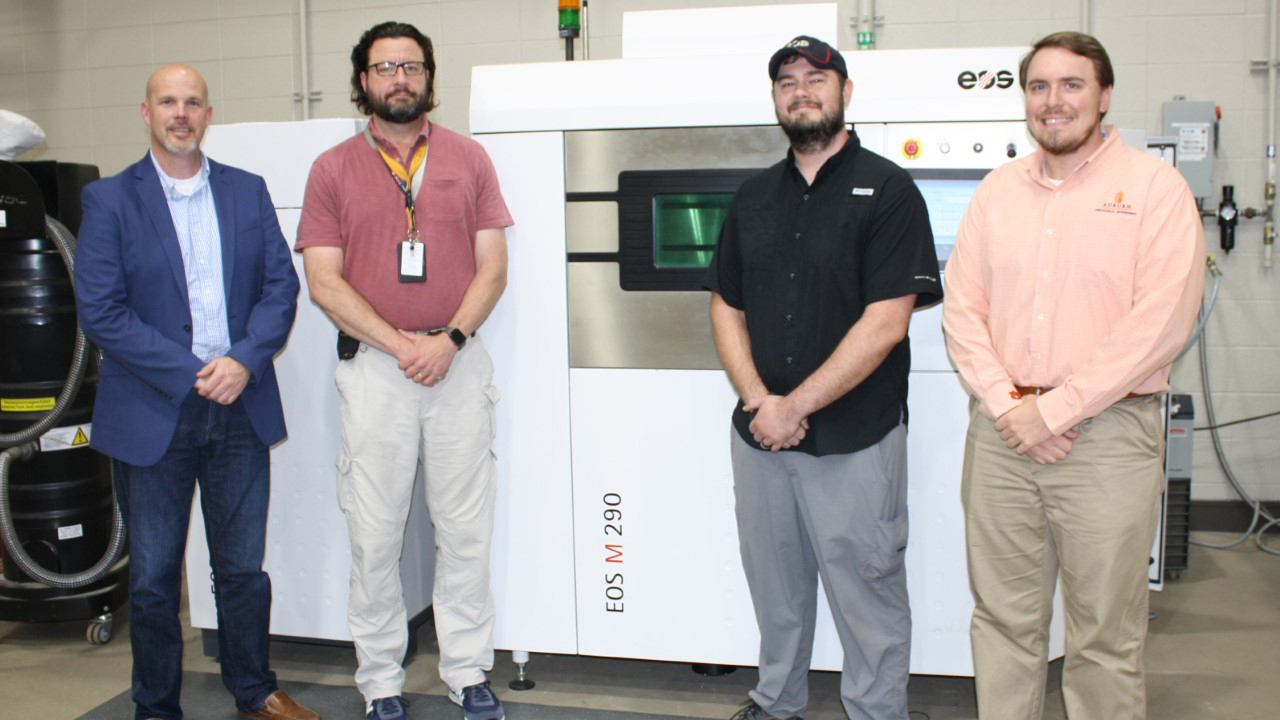Auburn University and Huntsville City Schools expand additive manufacturing partnership
Published: Aug 5, 2019 12:00 PM
By Morgan Martin
Auburn University’s National Center for Additive Manufacturing Excellence, or NCAME, is expanding its existing partnership with Huntsville City Schools to enable more students to gain real-world experience in industrial 3D printing.
“Two years ago Huntsville City Schools became the only K-12 school district in the nation to implement a metal additive manufacturing program for high school students,” said Todd Watkins, director of Career Technical Education for Huntsville City Schools. “Located in separate facilities, the program partnered with local manufacturers and government agencies in an attempt to provide college and career opportunities to our students. While the program achieved success, it was not fully utilized until partnering with Auburn and NASA through the National Center for Additive Manufacturing Excellence.”
Working together with an on-site representative from EOS North America, NCAME and Huntsville City Schools recently brought the district’s second EOS M 290 additive machine online at Grissom High School. The first machine is located at Mae Jemison High School.
Teledyne Brown Engineering in Huntsville is joining the effort, offering support of the operations at Huntsville City Schools. Additionally, NCAME has hired Lee Fleming, a full-time staff member in Huntsville, to oversee both machines.
“Teaching students additive manufacturing concepts in high school is important because we need workforce in the field at all levels, from those who graduate high school with some credits and go straight to the workforce, to those who go to graduate school to become scientists to advance our technologies,” said Nima Shamsaei, director of NCAME. “Transformative additive manufacturing research and development depends on workers who can think between and across disciplines.”
This summer through NCAME, Calhoun Community College along with the University of Alabama in Huntsville implemented a pilot program focused on metal additive manufacturing. This is NCAME’s first step towards broadening North Alabama’s education and workforce development in additive manufacturing.
“Joint goals, like-minded ideas, and student success were at the top of our list when we joined forces with Auburn’s NCAME,” said Nina Bullock, lead faculty and program coordinator for Additive Manufacturing and Engineering Design Technology at Calhoun Community College. “Calhoun is the only two-year college in the state to offer an Associate of Applied Science degree in Additive Manufacturing.”
In July, representatives from NASA’s Marshall Space Flight Center, the U.S. Army’s Combat Capabilities Development Command, Auburn University and Huntsville City Schools outlined a strategy to bring a program similar to that at Calhoun Community College to Huntsville City Schools, enabling students to graduate high school with a certificate in additive manufacturing. The team’s ultimate goal is for students to earn college credits by participating in the program.
“With Auburn’s leadership, a Center of Excellence was formed that will structure an academic pathway for our students to gain the experience and knowledge to enter the workforce, or continue their education into a two-year training program or a university,” said Watkins. “Auburn University, along with the district’s Career and Technical teachers, will develop a curriculum and bring real-world projects to high school students which are the essential parts of a successful learning experience.” Media Contact: , stashml@auburn.edu, 256-327-3129
Team members from NCAME, Huntsville City Schools, and EOS worked together to bring online the district’s second industrial 3D printer at Grissom High School. From left: Todd Watkins, director of Career Technical Education for Huntsville City Schools; Chris Faust, additive manufacturing teacher at Grissom High School; Garrett Heath, technician at EOS North America, and Lee Fleming, graduate research assistant for NCAME.

